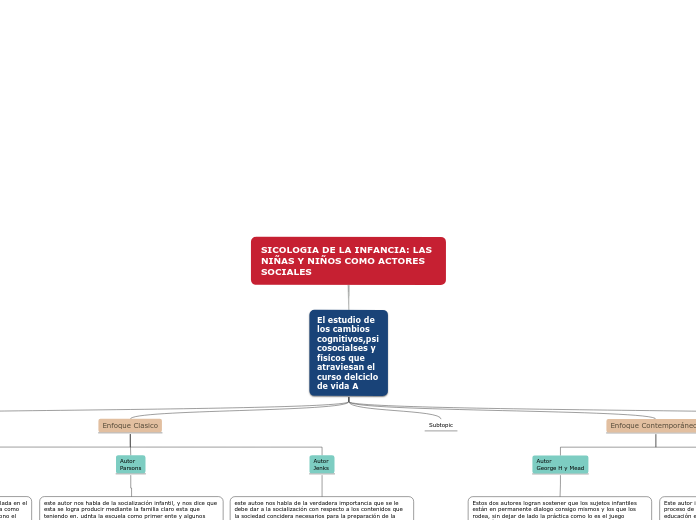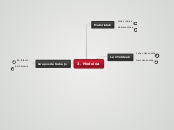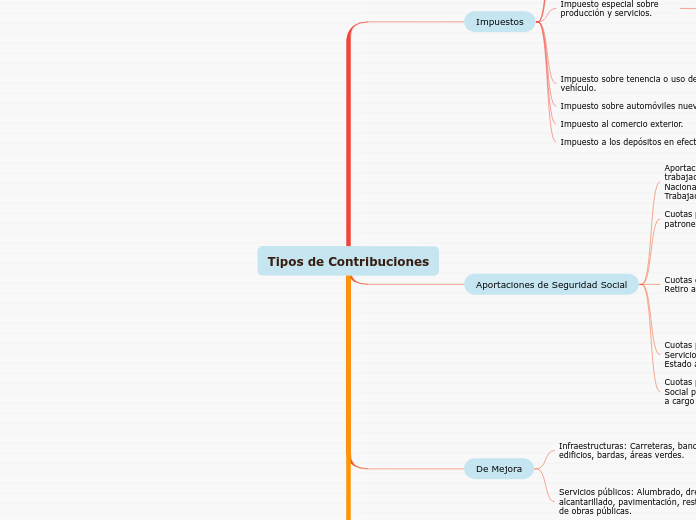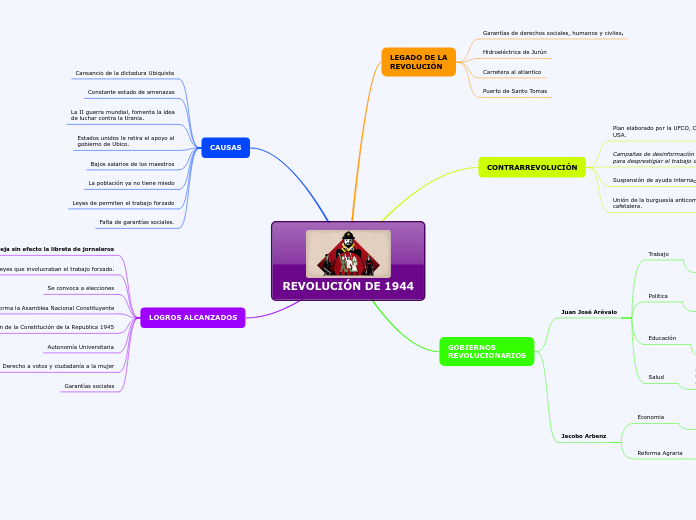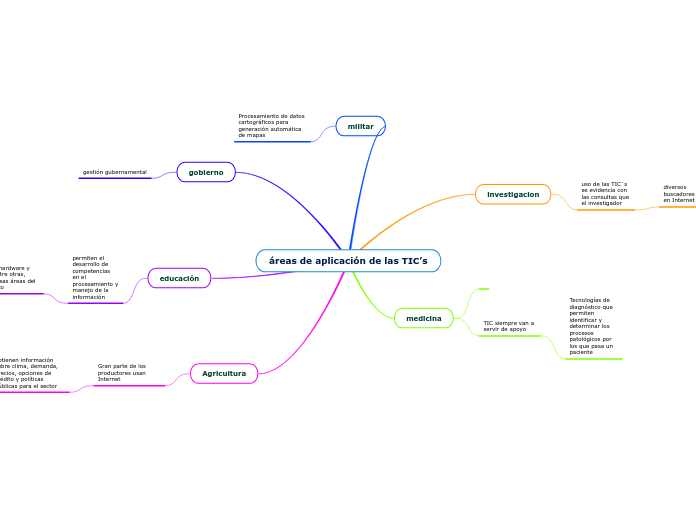SICOLOGIA DE LA INFANCIA: LAS NIÑAS Y NIÑOS COMO ACTORES SOCIALES
Type in the name of the multiple-perspectives text.
Example: Bridge to Terabithia by Katherine Paterson
El estudio de los cambios cognitivos,psicosocialses y físícos que atraviesan el curso delciclo de vida A
Identify an important issue from the text that is being presented from different angles. Type it in.
Example: Jesse's drawing talent.
Enfoque Constrctivista
Decide on the fourth point of view
Type in the name of the last character whose perspective on the issue you are going to present.
Example: Leslie Burke, Jesse's new next-door neighbor, and best friend.
Autores
James y Prout
Point of view
Type in a relevant quote that highlights the character's point of view. Try to follow a citation format: author's name, chapter, and page.
Example: I can't get the poetry of the trees,' he said. She nodded. Don't worry,' she said. You will someday. He believed her.' (Paterson, 4. 24)
Estos dos concederán que la infancia es una construcción social y logran exponen 6 rangos valiosos sobre nuevos paradigmas sociológicos de la misma.
How is the viewpoint introduced in the story?
Choose an answer:
First person point of view - using the personal pronouns 'I' or 'we'Second person point of view - using the personal pronoun 'you'Third person point of view - using the third-person pronouns 'he', 'she' and 'they'Omniscient point of view - an all-seeing observer tells the story
1. Se dice que la infancia es conocida como un carácter natural, pero que está integrado a un contexto social y cultural.2. Logran comprobar que existen varias infancias ya que por lo tanto no es in fenómeno ni unuco ni universal.3. Dícese que las relaciones sociales son independientes a las perspectivas de las personas adultas.
4. Dicen que los menores ( niños y niñas) no son objetivos si no la estructura de los procesos sociales.
5. Ellos toman la voz de los infantes como medio de estudios para diversos procesos sociologicos, teniendo en cuenta diversos metodos de estudió.
6. Se dice que los nuevos paradigmas son la reconstrucción tanto social y política que aportan a la infancia.
Enfoque Contemporáneos
Whose character does the third point of view belong to?
Type in his/her name.
Example: Mr. Aarons, Jesse's father.
Autor
Norbert Elias
Este autor identifica que las sociedades modernas no son el proceso de la civilización que se plazma a través de la educación e institución sobre el poder y control que se ejerce en la presiciòn de la infancia.
Autor
George H y Mead
What does the character think, say or do that suggests their perspective on the issue?
Type in a quote and try to maintain the citation format.
Example: 'He would like to show his drawings to his dad, but he didn't dare. (...) He'd thought his dad would be pleased. He wasn't. What are they teaching in that damn school? he had asked.' (Paterson, 2.8)
Estos dos autores logran sostener que los sujetos infantiles están en permanente dialogo consigo mismos y los que los rodea, sin dejar de lado la práctica como lo es el juego espontáneo y el juego organizado.
What kind of narration introduces the viewpoint?
Choose an answer:
First person point of view - using the personal pronouns 'I' or 'we'Second person point of view - using the personal pronoun 'you'Third person point of view - using the third-person pronouns 'he', 'she' and 'they'Omniscient point of view - an all-seeing observer tells the story
Subtopic
Enfoque Clasico
Decide on the second point of view
Name the character (it can either be the main character or one of the supporting characters) whose point of view you are presenting.
Example: Miss Edmunds, Jesse's music teacher.
Autor
Jenks
este autoe nos habla de la verdadera importancia que se le debe dar a la socialización con respecto a los contenidos que la sociedad concidera necesarios para la preparación de la adultes.
Autor
Parsons
este autor nos habla de la socialización infantil, y nos dice que esta se logra producir mediante la familia claro esta que teniendo en. udnta la escuela como primer ente y algunos grupos iguales como la misma clase social.
Autor
Emile Ourkheim
Type in a quote that points out the character's position about the issue.
Try to follow a citation format: author's name, chapter, and page.
Example: 'She said he was unusually talented, and she hoped he wouldn't let anything discourage him.' (Paterson, 2. 8)
este autor se refiere a que la educación está desarrollada en el pensamiento de la infancia, pero también la considera como un período de crecimiento tanto en el sentido físico cono el moral ya que de necesita para la vida social.
How is the viewpoint introduced in the story?
Choose an answer:
First person point of viewSecond person point of viewThird person point of viewOmniscient point of view
Conceptos
Decide on the first point of view you are going to present.
Type in the name of the character (it can either be the main character or one of the supporting characters) whose point of view belongs to.
Example: Jesse Oliver Aarons, Jr., the main character of the novel, a fifth-grader living in a rural Southern area.
Dicese que la acción propia de los niños es la NIÑERIA
y que el principio o primeros tiempos son de cualquier cosa por lo tanto es la INFANCIA.
Type in a relevant quote that highlights the character's point of view towards
El estudio de los cambios cognitivos,psicosocialses y físícos que atraviesan el curso delciclo de vida A.
Try following a citation format: author's name, chapter, and page.
Example: 'Jesse drew the way some people drank whiskey. (...) Lord, he loved to draw. (...) When he was in first grade, he told his father that he wanted to be an artist when he grew up.' (Paterson, 2. 7)
(Gaitan) define la infancia como una condición social, determinada como una construcción cultural e histórica, que se relaciona con características por medio de relaciones con el poder.
What type of narration introduces the viewpoint?
Choose an answer:
First person point of view - using the personal pronouns 'I' or 'we'Second person point of view - using the personal pronoun 'you'Third person point of view - using the third-person pronouns 'he', 'she' and 'they'Omniscient point of view - an all-seeing observer tells the story
